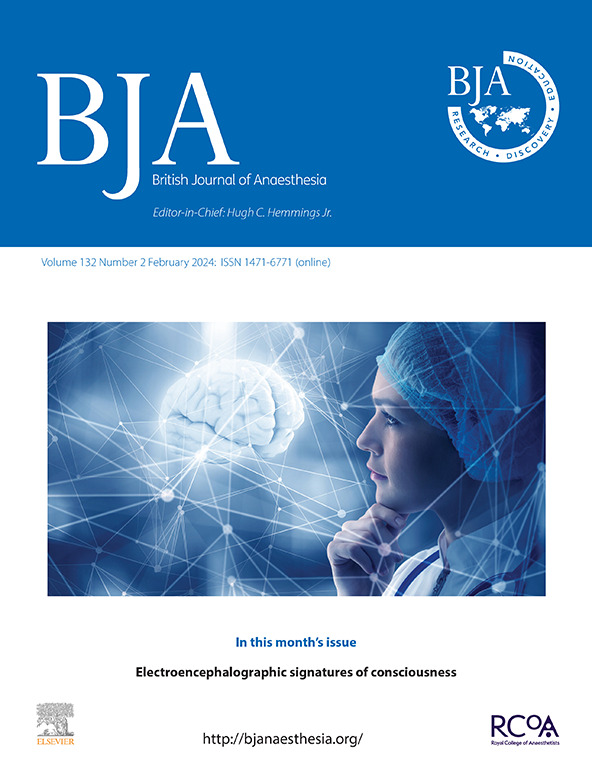细胞减灭术期间和术后腹腔注射局部麻醉剂罗哌卡因对晚期卵巢癌辅助化疗间隔时间的影响:随机双盲 III 期试验。
IF 9.1
1区 医学
Q1 ANESTHESIOLOGY
引用次数: 0
摘要
背景:在之前的一项II期试验中,腹腔内局部麻醉缩短了手术与辅助化疗之间的时间间隔,而这一终点与晚期卵巢癌生存率的提高有关。我们的目标是在 III 期试验中验证这一点:在瑞典的两所大学医院进行了一项双盲、III 期平行优越性试验,这两所医院都属于公立集中式医疗系统。年龄大于 18 岁、患有晚期卵巢癌并计划接受细胞切除手术、ASA 身体状况为 1-3 级且无言语/语言问题的女性均符合条件。参与者通过中央计算机系统被随机分配到手术中和手术后腹腔注射0.2%罗哌卡因或0.9%生理盐水(安慰剂)。主要终点是恢复预期肿瘤治疗(RIOT)的时间,采用t检验和线性回归进行分析,并根据中心进行调整:在2020年8月至2023年12月期间随机接受治疗的225名妇女中(罗哌卡因113人;安慰剂112人),175人被纳入修改后的意向治疗分析(罗哌卡因86人;安慰剂89人)。年龄中位数:罗哌卡因组 64 岁(56-73 岁),安慰剂组 66 岁(57-74 岁):66岁(57-74岁)。罗哌卡因组的平均 RIOT 为 26.5 天,安慰剂组为 25.8 天,平均相差 0.7 天(-2.2 到 3.4 天;P=0.65)。对 166 名妇女进行的每方案分析结果相似,平均差异为 0.5 天(-2.4 天至 3.4 天;P=0.74)。短期恢复和术后发病率没有差异:临床试验注册:临床试验注册:ClinicalTrials.gov(NCT04065009),欧盟临床试验注册(2019-003299-38/SE)。本文章由计算机程序翻译,如有差异,请以英文原文为准。
Effect of intraperitoneal ropivacaine during and after cytoreductive surgery on time-interval to adjuvant chemotherapy in advanced ovarian cancer: a randomised, double-blind phase III trial
Background
In a previous phase II trial, intraperitoneal local anaesthetics shortened the time interval between surgery and adjuvant chemotherapy, an endpoint associated with improved survival in advanced ovarian cancer. Our objective was to test this in a phase III trial.
Methods
A double-blind, phase III parallel superiority trial was conducted at two university hospitals in Sweden, within a public and centralised healthcare system. Women >18 yr with advanced ovarian cancer scheduled for cytoreductive surgery, an ASA physical status of 1–3 with no speech/language issues, were eligible. Participants were randomly assigned using a central computerised system to receive either ropivacaine 0.2% or saline 0.9% (placebo) intraperitoneally during and after surgery. The primary endpoint was time to return to intended oncologic therapy (RIOT), analysed using t-test and linear regression adjusted for centre.
Results
Of the 225 women randomised between August 2020 and December 2023 (ropivacaine n=113; placebo n=112), 175 were included in the modified intention-to-treat analysis (ropivacaine n=86; placebo n=89). Median age: ropivacaine group 64 yr (56–73 yr), placebo group: 66 yr (57–74 yr). The mean RIOT in the ropivacaine group was 26.5 days vs 25.8 days in the placebo group, with a mean difference of 0.7 days (−2.2 to 3.4 days; P=0.65). Per-protocol analysis of 166 women yielded similar results, mean difference of 0.5 days (−2.4 to 3.4 days; P=0.74) days. There were no differences in short-term recovery or postoperative morbidity.
Conclusion
Intraperitoneal local anaesthetic did not shorten the time to RIOT among women undergoing surgery for advanced ovarian cancer in this trial.
Clinical trial registration
ClinicalTrials.gov (NCT04065009), European Union Clinical Trials Register (2019-003299-38/SE).
求助全文
通过发布文献求助,成功后即可免费获取论文全文。
去求助
来源期刊
CiteScore
13.50
自引率
7.10%
发文量
488
审稿时长
27 days
期刊介绍:
The British Journal of Anaesthesia (BJA) is a prestigious publication that covers a wide range of topics in anaesthesia, critical care medicine, pain medicine, and perioperative medicine. It aims to disseminate high-impact original research, spanning fundamental, translational, and clinical sciences, as well as clinical practice, technology, education, and training. Additionally, the journal features review articles, notable case reports, correspondence, and special articles that appeal to a broader audience.
The BJA is proudly associated with The Royal College of Anaesthetists, The College of Anaesthesiologists of Ireland, and The Hong Kong College of Anaesthesiologists. This partnership provides members of these esteemed institutions with access to not only the BJA but also its sister publication, BJA Education. It is essential to note that both journals maintain their editorial independence.
Overall, the BJA offers a diverse and comprehensive platform for anaesthetists, critical care physicians, pain specialists, and perioperative medicine practitioners to contribute and stay updated with the latest advancements in their respective fields.

 求助内容:
求助内容: 应助结果提醒方式:
应助结果提醒方式:


